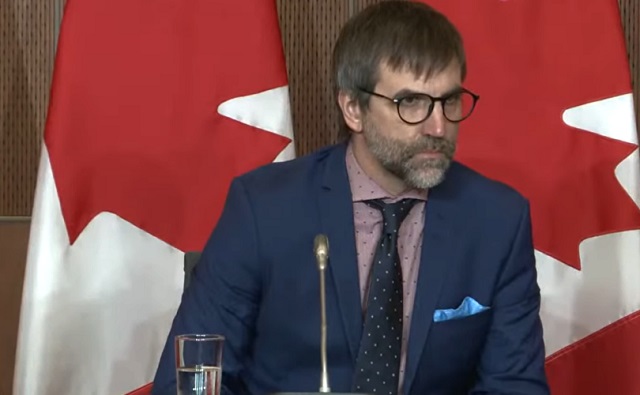Energy
Stop The Cap On Oil And Gas

From Project Confederation
With the United Nations’s 28th Climate Change Conference in Dubai generating headlines, we all knew it was only a matter of time before Canada’s radical eco-activist Environment Minister did something stupid.
And here it is, from Steven Guilbeault himself:
“The Government of Canada’s plan to cap and reduce emissions from Canada’s largest emitting sector is ambitious, but practical. It considers the global demand for oil and gas — and the importance of the sector in Canada’s economy — and sets a limit that is strict, but achievable.”
That’s right, folks – the Oil and Gas emissions/production cap is finally upon us.
We launched a campaign last year, around this same time, warning that this was coming.
Now, we know just how bad it actually is.
If you already agree that we should Stop The Cap On Oil And Gas,
click here to sign the petition, but if you want more details, read on!
The framework that’s being proposed by the federal government would cap emissions at 35% – 38% below 2019 levels.
How exactly would this be done?
What will it cost?
No one knows.
The federal government just says that they’ll release the details via regulation sometime next year.
Alberta Premier Danielle Smith is livid, issuing a statement:
“[The announcement is an] intentional attack by the federal government on the economy of Alberta and the financial well-being of millions of Albertans and Canadians.”
“Justin Trudeau and his eco-extremist Minister of the Environment and Climate Change, Steven Guilbeault, are risking hundreds of billions of investments in Alberta’s and Canada’s economy.”
Saskatchewan Premier Scott Moe echoed Smith:
“[The cap] will have serious economic impacts on Canadians and limit our sustainable Canadian energy products from providing heat and electricity to the world.”
“Saskatchewan will protect our constitutional right to build our economy in accordance with the priorities of Saskatchewan families and businesses.”
The federal government has been in legal hot water lately over constitutional overreaches – with the Supreme Court deeming the Impact Assessment Act unconstitutional in October and the Federal Court ruling the plastics ban unconstitutional in November.
Ottawa has consistently ignored provincial jurisdiction on a wide range of issues, and their inability to stay in their constitutional lane has been a major source of tension with the provinces.
This emissions cap is just the latest example, as natural resource development is guaranteed to be the sole jurisdiction of the provinces in the Constitution of Canada.
As such, the emissions cap is clearly unconstitutional – but even if it wasn’t, it would be a terrible policy anyway.
First, it’s an admission by the government that the carbon tax – their signature climate change policy – is not working.
The entire purpose of the tax was to be a “market mechanism” to reduce emissions, and yet now they’re admitting that they need even more regulations to reduce emissions.
This cap is a direct and deliberate attack on western Canada’s oil and gas industry.
Remember – the cap will not apply to any industry other than oil and gas.
Ontario’s automotive industry, Quebec’s cement industry, and other high-emitting industries in other parts of Canada are not having their emissions capped.
The cap also excludes refineries – even though that is part of the oil and gas industry – because many of Canada’s refineries happen to be in regions of the country that mostly vote Liberal.
If the federal government were actually concerned about the environment, they would implement policies designed to reduce emissions across all industries and all regions of Canada.
Instead, the hypocritical and political nature of Ottawa’s climate agenda reveals their true intentions and undermines the credibility of their entire plan.
That’s why we’re renewing our campaign calling on the federal government to back off, respect the Constitution, and stop infringing on provincial jurisdiction.
If you agree, please sign our petition to Stop The Cap On Oil And Gas:
Josh Andrus
Executive Director
Project Confederation
Alberta
Premier Smith: Canadians support agreement between Alberta and Ottawa and the major economic opportunities it could unlock for the benefit of all

From Energy Now
By Premier Danielle Smith
Get the Latest Canadian Focused Energy News Delivered to You! It’s FREE: Quick Sign-Up Here
If Canada wants to lead global energy security efforts, build out sovereign AI infrastructure, increase funding to social programs and national defence and expand trade to new markets, we must unleash the full potential of our vast natural resources and embrace our role as a global energy superpower.
The Alberta-Ottawa Energy agreement is the first step in accomplishing all of these critical objectives.
Recent polling shows that a majority of Canadians are supportive of this agreement and the major economic opportunities it could unlock for the benefit of all Canadians.
As a nation we must embrace two important realities: First, global demand for oil is increasing and second, Canada needs to generate more revenue to address its fiscal challenges.
Nations around the world — including Korea, Japan, India, Taiwan and China in Asia as well as various European nations — continue to ask for Canadian energy. We are perfectly positioned to meet those needs and lead global energy security efforts.
Our heavy oil is not only abundant, it’s responsibly developed, geopolitically stable and backed by decades of proven supply.
If we want to pay down our debt, increase funding to social programs and meet our NATO defence spending commitments, then we need to generate more revenue. And the best way to do so is to leverage our vast natural resources.
At today’s prices, Alberta’s proven oil and gas reserves represent trillions in value.
It’s not just a number; it’s a generational opportunity for Alberta and Canada to secure prosperity and invest in the future of our communities. But to unlock the full potential of this resource, we need the infrastructure to match our ambition.
There is one nation-building project that stands above all others in its ability to deliver economic benefits to Canada — a new bitumen pipeline to Asian markets.
The energy agreement signed on Nov. 27 includes a clear path to the construction of a one-million-plus barrel-per-day bitumen pipeline, with Indigenous co-ownership, that can ensure our province and country are no longer dependent on just one customer to buy our most valuable resource.
Indigenous co-ownership also provide millions in revenue to communities along the route of the project to the northwest coast, contributing toward long-lasting prosperity for their people.
The agreement also recognizes that we can increase oil and gas production while reducing our emissions.
The removal of the oil and gas emissions cap will allow our energy producers to grow and thrive again and the suspension of the federal net-zero power regulations in Alberta will open to doors to major AI data-centre investment.
It also means that Alberta will be a world leader in the development and implementation of emissions-reduction infrastructure — particularly in carbon capture utilization and storage.
The agreement will see Alberta work together with our federal partners and the Pathways companies to commence and complete the world’s largest carbon capture, utilization and storage infrastructure project.
This would make Alberta heavy oil the lowest intensity barrel on the market and displace millions of barrels of heavier-emitting fuels around the globe.
We’re sending a clear message to investors across the world: Alberta and Canada are leaders, not just in oil and gas, but in the innovation and technologies that are cutting per barrel emissions even as we ramp up production.
Where we are going — and where we intend to go with more frequency — is east, west, north and south, across oceans and around the globe. We have the energy other countries need, and will continue to need, for decades to come.
However, this agreement is just the first step in this journey. There is much hard work ahead of us. Trust must be built and earned in this partnership as we move through the next steps of this process.
But it’s very encouraging that Prime Minister Mark Carney has made it clear he is willing to work with Alberta’s government to accomplish our shared goal of making Canada an energy superpower.
That is something we have not seen from a Canadian prime minister in more than a decade.
Together, in good faith, Alberta and Ottawa have taken the first step towards making Canada a global energy superpower for benefit of all Canadians.
Danielle Smith is the Premier of Alberta
Alberta
A Memorandum of Understanding that no Canadian can understand

From the Fraser Institute
The federal and Alberta governments recently released their much-anticipated Memorandum of Understanding (MOU) outlining what it will take to build a pipeline from Alberta, through British Columbia, to tidewater to get more of our oil to markets beyond the United States.
This was great news, according to most in the media: “Ottawa-Alberta deal clears hurdles for West Coast pipeline,” was the top headline on the Globe and Mail’s website, “Carney inks new energy deal with Alberta, paving way to new pipeline” according to the National Post.
And the reaction from the political class? Well, former federal environment minister Steven Guilbeault resigned from Prime Minister Carney’s cabinet, perhaps positively indicating that this agreement might actually produce a new pipeline. Jason Kenney, a former Alberta premier and Harper government cabinet minister, congratulated Prime Minister Carney and Premier Smith on an “historic agreement.” Even Alberta NDP Leader Naheed Nenshi called the MOU “a positive step for our energy future.”
Finally, as Prime Minister Carney promised, Canada might build critical infrastructure “at a speed and scale not seen in generations.”
Given this seemingly great news, I eagerly read the six-page Memorandum of Understanding. Then I read it again and again. Each time, my enthusiasm and understanding diminished rapidly. By the fourth reading, the only objective conclusion I could reach was not that a pipeline would finally be built, but rather that only governments could write an MOU that no Canadian could understand.
The MOU is utterly incoherent. Go ahead, read it for yourself online. It’s only six pages. Here are a few examples.
The agreement states that, “Canada and Alberta agree that the approval, commencement and continued construction of the bitumen pipeline is a prerequisite to the Pathways project.” Then on the next line, “Canada and Alberta agree that the Pathways Project is also a prerequisite to the approval, commencement and continued construction of the bitumen pipeline.”
Two things, of course, cannot logically be prerequisites for each other.
But worry not, under the MOU, Alberta and Ottawa will appoint an “Implementation Committee” to deliver “outcomes” (this is from a federal government that just created the “Major Project Office” to get major projects approved and constructed) including “Determining the means by which Alberta can submit its pipeline application to the Major Projects Office on or before July 1, 2026.”
What does “Determining the means” even mean?
What’s worse is that under the MOU, the application for this pipeline project must be “ready to submit to the Major Projects Office on or before July 1, 2026.” Then it could be another two years (or until 2028) before Ottawa approves the pipeline project. But the MOU states the Pathways Project is to be built in stages, starting in 2027. And that takes us back to the circular reasoning of the prerequisites noted above.
Other conditions needed to move forward include:
The private sector must construct and finance the pipeline. Serious question: which private-sector firm would take this risk? And does the Alberta government plan to indemnify the company against these risks?
Indigenous Peoples must co-own the pipeline project.
Alberta must collaborate with B.C. to ensure British Columbians get a cut or “share substantial economic and financial benefits of the proposed pipeline” in MOU speak.
None of this, of course, addresses the major issue in our country—that is, investors lack clarity on timelines and certainty about project approvals. The Carney government established the Major Project Office to fast-track project approvals and provide greater certainty. Of the 11 project “winners” the federal government has already picked, most either already had approvals or are already at an advanced stage in the process. And one of the most important nation-building projects—a pipeline to get our oil to tidewater—hasn’t even been referred to the Major Project Office.
What message does all this send to the investment community? Have we made it easier to get projects approved? No. Have we made things clearer? No. Business investment in Canada has fallen off a cliff and is down 25 per cent per worker since 2014. We’ve seen a massive outflow of capital from the country, more than $388 billion since 2014.
To change this, Canada needs clear rules and certain timelines for project approvals. Not an opaque Memorandum of Understanding.
-

 illegal immigration1 day ago
illegal immigration1 day agoWhile Trump has southern border secure, hundreds of thousands of illegal immigrants still flooding in from Canada
-

 Censorship Industrial Complex1 day ago
Censorship Industrial Complex1 day agoCanadian bishops condemn Liberal ‘hate speech’ proposal that could criminalize quoting Scripture
-

 National2 days ago
National2 days agoAlberta will use provincial laws to stop Canadian gov’t from trying to confiscate legal firearms
-

 COVID-192 days ago
COVID-192 days agoCanadian legislator introduces bill to establish ‘Freedom Convoy Recognition Day’ as a holiday
-

 Energy2 days ago
Energy2 days agoA look inside the ‘floatel’ housing B.C.’s LNG workforce
-

 Daily Caller17 hours ago
Daily Caller17 hours agoTrump Orders Review Of Why U.S. Childhood Vaccination Schedule Has More Shots Than Peer Countries
-

 Business2 days ago
Business2 days agoUS Energy Secretary says price of energy determined by politicians and policies
-

 Economy1 day ago
Economy1 day agoWhat the Data Shows About the New Canada-Alberta Pipeline Opportunity










